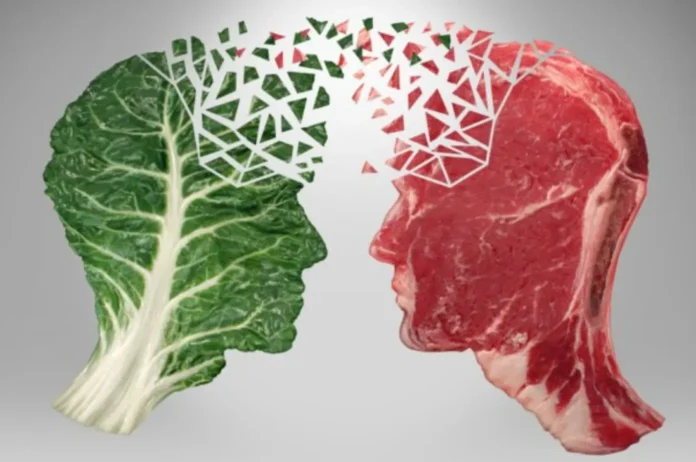Choosing the right diet can be a daunting task given the plethora of options available today. One of the most debated topics in nutrition is whether to follow a vegetarian (veg) or non-vegetarian (non-veg) diet. Both diets offer unique benefits and challenges. This blog(veg vs. non-veg) will explore the key differences, health benefits, potential drawbacks, and tips for making an informed decision that aligns with your health goals, ethical beliefs, and personal preferences.
Understanding Veg vs. Non-Veg Diets

- Vegetarian Diet: A vegetarian diet primarily consists of plant-based foods such as vegetables, fruits, legumes, nuts, seeds, and grains. Variations include:
- Lacto-Vegetarian: Includes dairy products but excludes eggs, meat, and fish.
- Ovo-Vegetarian: Includes eggs but excludes dairy products, meat, and fish.
- Lacto-Ovo Vegetarian: Includes both dairy products and eggs but excludes meat and fish.
- Vegan: Excludes all animal products including dairy, eggs, and honey.
- Non-Vegetarian Diet: A non-vegetarian diet includes animal products such as meat, fish, poultry, and sometimes dairy and eggs. Non-vegetarians consume a variety of animal-based foods along with plant-based options.
Health Benefits of Vegetarian Diets

1. Heart Health: A vegetarian diet can reduce the risk of heart disease due to lower saturated fat, cholesterol, and higher dietary fiber. This can help lower blood pressure and improve heart health.
2. Weight Management: Vegetarians often have a lower body mass index (BMI). The high fiber content in plant-based foods promotes satiety and helps control appetite, aiding in weight management.
3. Lower Risk of Chronic Diseases: A vegetarian diet is linked to a reduced risk of chronic diseases like type 2 diabetes, hypertension, and certain cancers. The abundance of antioxidants, vitamins, and minerals in plant-based foods supports overall health and disease prevention.
4. Improved Digestion: High-fiber diets, common in vegetarianism, aid in better digestion and prevent constipation, promoting a healthy digestive system.
Health Benefits of Non-Vegetarian Diets

1. Complete Protein Sources: Animal products provide all essential amino acids, making them complete protein sources. This is beneficial for muscle growth, repair, and overall bodily functions.
2. Rich in Vitamins and Minerals: Non-vegetarian diets are rich in essential nutrients such as vitamin B12, iron, zinc, and omega-3 fatty acids. Vitamin B12, crucial for nerve function and blood cell production, is primarily found in animal products.
3. Muscle Health: High protein content in meat and fish supports muscle health, which can be advantageous for athletes and those with higher protein needs.
4. Satiety and Satisfaction: Non-vegetarian foods are often more satiating due to their protein and fat content, helping to control hunger and reduce overeating.
Potential Drawbacks of Vegetarian Diets
1. Nutrient Deficiencies: Vegetarians may risk deficiencies in nutrients such as vitamin B12, iron, calcium, and omega-3 fatty acids. Careful planning and supplementation can help mitigate these risks.
2. Protein Intake: While plant-based proteins are plentiful, they may not always be complete. Vegetarians need to consume a variety of protein sources to ensure they get all essential amino acids.
3. Social and Cultural Challenges: Following a vegetarian diet can be challenging in some cultures and social settings due to limited food choices and social pressures.
Potential Drawbacks of Non-Vegetarian Diets
1. Health Risks: High consumption of red and processed meats is linked to an increased risk of heart disease, certain cancers, and other chronic diseases. Opting for lean meats and limiting processed foods is advisable.
2. Ethical and Environmental Concerns: Many people avoid animal products due to ethical concerns about animal welfare and the environmental impact of meat production.
3. Cost: Non-vegetarian diets can sometimes be more expensive due to the higher cost of meat and fish compared to plant-based foods.
Making an Informed Decision

When deciding between a veg vs. non-veg diet, consider the following:
1. Health Goals: Identify your health priorities. A vegetarian diet may suit those looking to improve heart health or manage weight, while a non-vegetarian diet might be better for muscle building or addressing specific nutrient deficiencies.
2. Nutritional Balance: Ensure your diet is balanced and provides all necessary nutrients. Vegetarians should focus on diverse plant-based proteins, and non-vegetarians should choose lean meats and include plenty of fruits and vegetables.
3. Ethical Beliefs: Reflect on your values and beliefs regarding animal welfare and environmental sustainability, which can influence your dietary choice.
4. Lifestyle and Preferences: Your lifestyle, cultural background, and food preferences are crucial. Choose a diet that fits your daily life and is sustainable in the long term.
Conclusion
The debate between veg vs. non-veg diets is complex and multifaceted. Both diets offer unique health benefits and come with their own sets of challenges. The best diet for you aligns with your health goals, ethical beliefs, and lifestyle preferences. Making an informed decision ensures your diet is balanced, nutritious, and sustainable. Whether you choose a vegetarian or non-vegetarian diet, focusing on whole, minimally processed foods and maintaining a healthy lifestyle will contribute significantly to your overall well-being.
Have your own thoughts on veg vs. non-veg diets? Share your experiences and preferences in the comments below! For more insights and tips on healthy living, explore our other blog posts and stay informed.
Don’t forget to share this guide with friends and family who might find it useful. And if you have any questions or need further advice, feel free to reach out!



